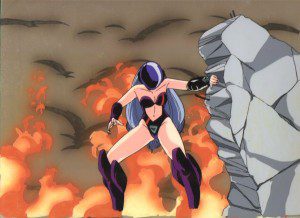 Before Haruhi Suzumiya and Sailor Moon, there was Eiko Megami.
Before Haruhi Suzumiya and Sailor Moon, there was Eiko Megami.
Originally released in 1986 in Japan, Katsuhiko Nishijima’s Project A-Ko was one of the early anime classics for American fans. It originally started out as an episode of a hentai anime series called Cream Lemon, but midway through production, it was decided to rework it as a mainstream theatrical release. In addition to being one of the earliest examples of the sailor-fuku magical girl genre of anime, Project A-Ko parodied many of the most popular Japanese and American superheroes of its day.
Eiko Megami (A-Ko) and Shiko Kotobuki (C-Ko) are lifelong best friends who are starting their first year at Graviton High School for Girls. They live in Graviton City, which was constructed on the site of the crash of an alien spaceship in Japan 16 years prior, depicted in the film’s opening credits. A-Ko is a lackadaisical, klutzy young woman who just happens to have superhuman strength which she uses carelessly, causing a lot of collateral damage. C-Ko is a flighty, emotionally needy girl who is dependent on A-Ko. On their first day at school, they encounter Biko Daitokuji (B-Ko), a spoiled older student whose father is the head of a powerful keiretsu (a business consortium consisting of financial and technological services). B-Ko develops an immediate infatuation with C-Ko, and an unconscious, intense hatred of A-Ko that goes beyond mere jealousy, and a bitter rivalry quickly develops between A-Ko and B-Ko. B-Ko, who is an engineering genius, uses her father’s resources to send increasingly powerful mecha to defeat A-Ko, but none of them are a match for A-Ko’s strength. After numerous failures, B-Ko finally unleashes her secret weapon, a cybernetic bikini which gives her the strength to match A-Ko in battle as well as high-powered weaponry.

Meanwhile, while A-Ko and B-Ko are fighting it out over C-Ko, a mysterious man wearing sunglasses known only as “D” is carefully watching over C-Ko, and sending reports back to a space battleship heading towards Earth. The all-female alien race believes that C-Ko is their princess, who was lost on Earth when the spaceship carrying her crashed into the site now occupied by Graviton City sixteen years ago, and are coming to get her!
In addition to the main story about the conflict over C-Ko, Project A-Ko is rife with references to Japanese and American pop culture of the 1980’s. A-Ko’s parents are based on Superman and Wonder Woman (her father even has a Superman “S” on his blue shirt in one scene), Her rival B-Ko’s father is based heavily on Tony Stark (Iron Man), and the rivalry between A-Ko and B-Ko is therefore also a parody of the rivalry between American comic publishers DC and Marvel. B-Ko’s huge, muscular lackey Mari is a feminized parody of Kenshiro from Fist of the North Star, while the alcoholic masculine female alien captain, Napolipolita, is an homage to Galaxy Express 999’s Captain Harlock. A movie A-Ko and C-Ko watch even features a parody of KFC icon Colonel Sanders, a reference which brought a smile to my face.
Project A-Ko was a big-budget production, featuring what were at the time state-of-the-art animation techniques and impressive special effects. The visual style of Project A-Ko pegs it as a 1980’s anime, with the characters featuring the puffy hair and slightly chunky proportions typical of anime characters of the time. Project A-Ko’s soundtrack was produced in the United States rather than in Japan, by Joey Carbone and Richie Zito.
The movie was very popular in Japan and spawned three sequels (Plot of the Daitokuji Financial Group, Cinderella Rhapsody, and Final), as well as a spin-off series featuring the three main characters in an alternate universe (Versus Battle). Released in the USA by Central Park Media, it achieved cult status among American fans in the era before Dragon Ball Z and Pokemon became mainstream US hits.
Though its pop-culture references are now a bit dated, Project A-Ko is still an entertaining film. The action sequences are still thrilling, and the film’s cinematography is outstanding. The main plot, despite being a little silly, has a lot of heart, and the seemingly non-sequitur sub-plots are nearly tied up at the end when A-Ko and B-Ko have briefly set aside their differences to save C-Ko from the aliens. Though it has yuri overtones, vestiges of its Cream Lemon heritage, Project A-Ko is really about something much simpler: the strong bonds that bind two BFFs in spite of everything.
Project A-Ko was re-released in the USA by Eastern Star on May 17, 2011. There are brief flashes of nudity and plenty of violence, and if you’re not familiar with older anime, some of the pop-culture references will go over your head. Those caveats aside, Project A-Ko is nevertheless a film that anime buffs will enjoy, and is well worth checking out.


